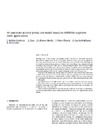Identificador persistente para citar o vincular este elemento:
https://accedacris.ulpgc.es/jspui/handle/10553/49278
| Título: | HF spectrum activity prediction model based on HMM for cognitive radio applications | Autores/as: | Melian Gutierrez,Laura Beatriz Zazo, S. Blanco-Murillo, J. L. Pérez-Álvarez, I. García Rodríguez, A. Pérez Díaz, Baltasar |
Clasificación UNESCO: | 3325 Tecnología de las telecomunicaciones | Palabras clave: | Cognitive radio HF Hidden Markov model Prediction |
Fecha de publicación: | 2013 | Editor/a: | 1874-4907 | Publicación seriada: | Physical Communication | Resumen: | Although most of the research on Cognitive Radio is focused on communication bands above the HF upper limit (30 MHz), Cognitive Radio principles can also be applied to HF communications to make use of the extremely scarce spectrum more efficiently. In this work we consider legacy users as primary users since these users transmit without resorting to any smart procedure, and our stations using the HFDVL (HF Data+Voice Link) architecture as secondary users. Our goal is to enhance an efficient use of the HF band by detecting the presence of uncoordinated primary users and avoiding collisions with them while transmitting in different HF channels using our broad-band HF transceiver.A model of the primary user activity dynamics in the HF band is developed in this work to make short-term predictions of the sojourn time of a primary user in the band and avoid collisions. It is based on Hidden Markov Models (HMM) which are a powerful tool for modelling stochastic random processes and are trained with real measurements of the 14 MHz band.By using the proposed HMM based model, the prediction model achieves an average 10.3% prediction error rate with one minute-long channel knowledge but it can be reduced when this knowledge is extended: with the previous 8 min knowledge, an average 5.8% prediction error rate is achieved.These results suggest that the resulting activity model for the HF band could actually be used to predict primary users activity and included in a future HF cognitive radio based station. | URI: | https://accedacris.ulpgc.es/handle/10553/49278 | ISSN: | 1874-4907 | DOI: | 10.1016/j.phycom.2012.09.004 | Fuente: | Physical Communication[ISSN 1874-4907],v. 9, p. 199-211 |
| Colección: | Artículos |
Citas SCOPUSTM
25
actualizado el 08-jun-2025
Citas de WEB OF SCIENCETM
Citations
17
actualizado el 22-feb-2026
Visitas
199
actualizado el 09-ene-2026
Descargas
118
actualizado el 09-ene-2026
Google ScholarTM
Verifica
Altmetric
Comparte
Exporta metadatos
Los elementos en ULPGC accedaCRIS están protegidos por derechos de autor con todos los derechos reservados, a menos que se indique lo contrario.
